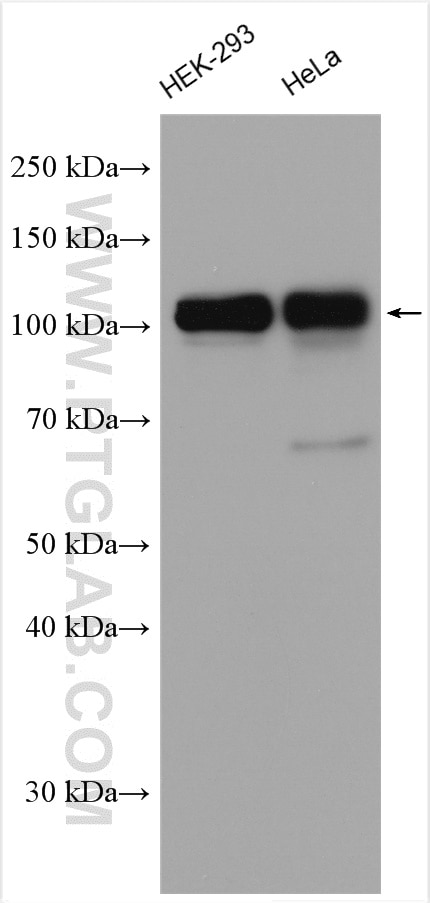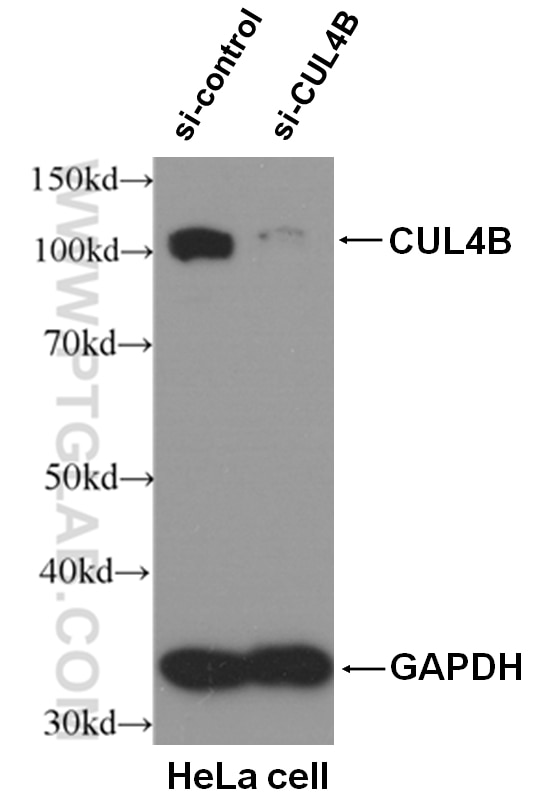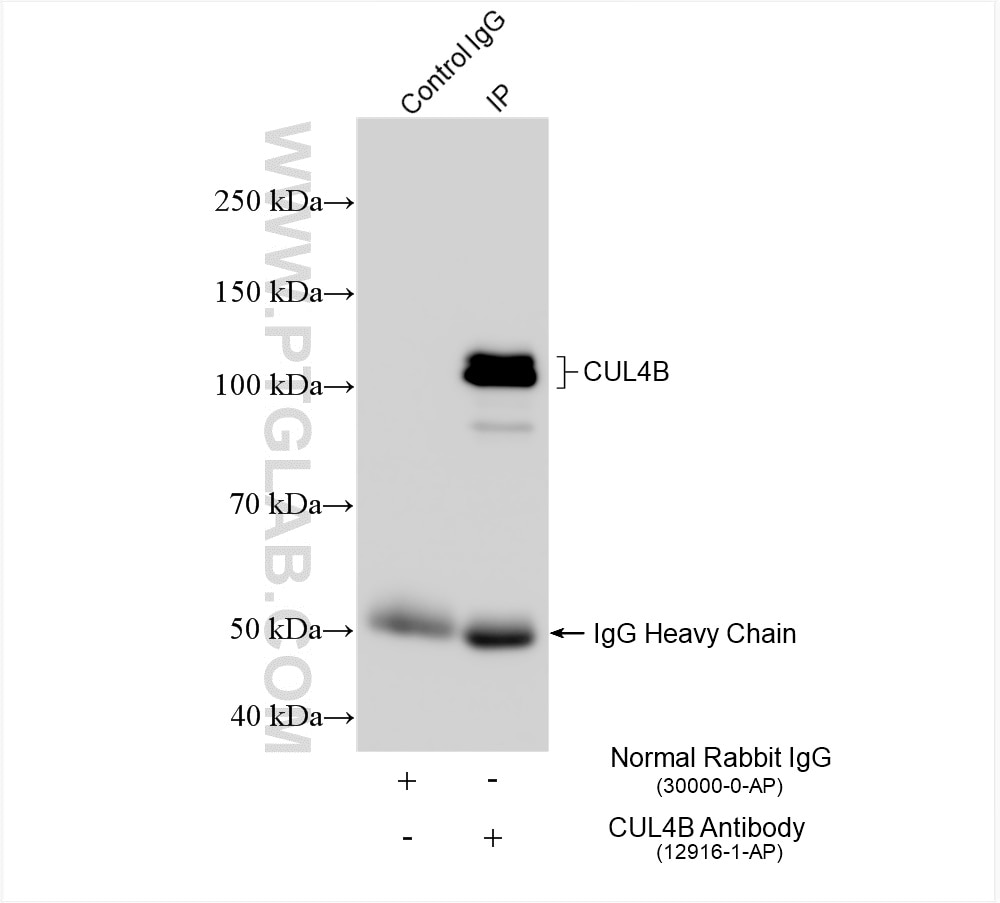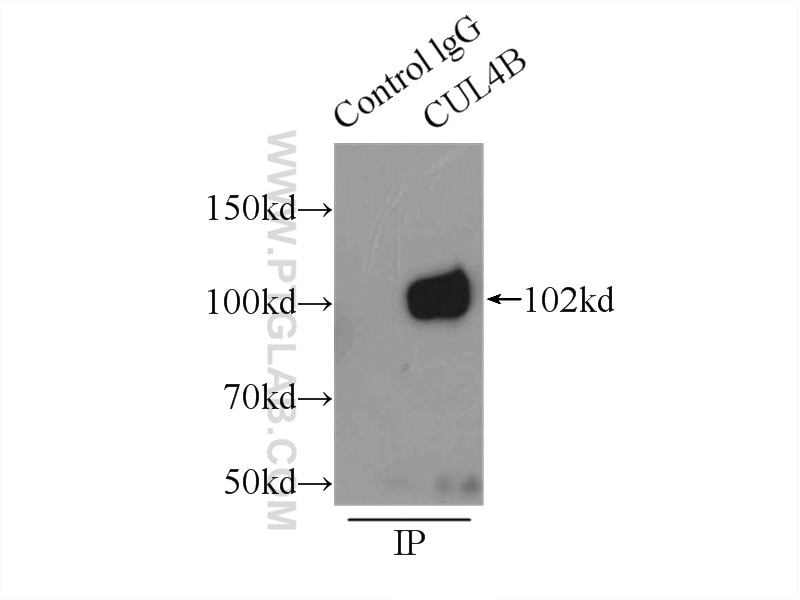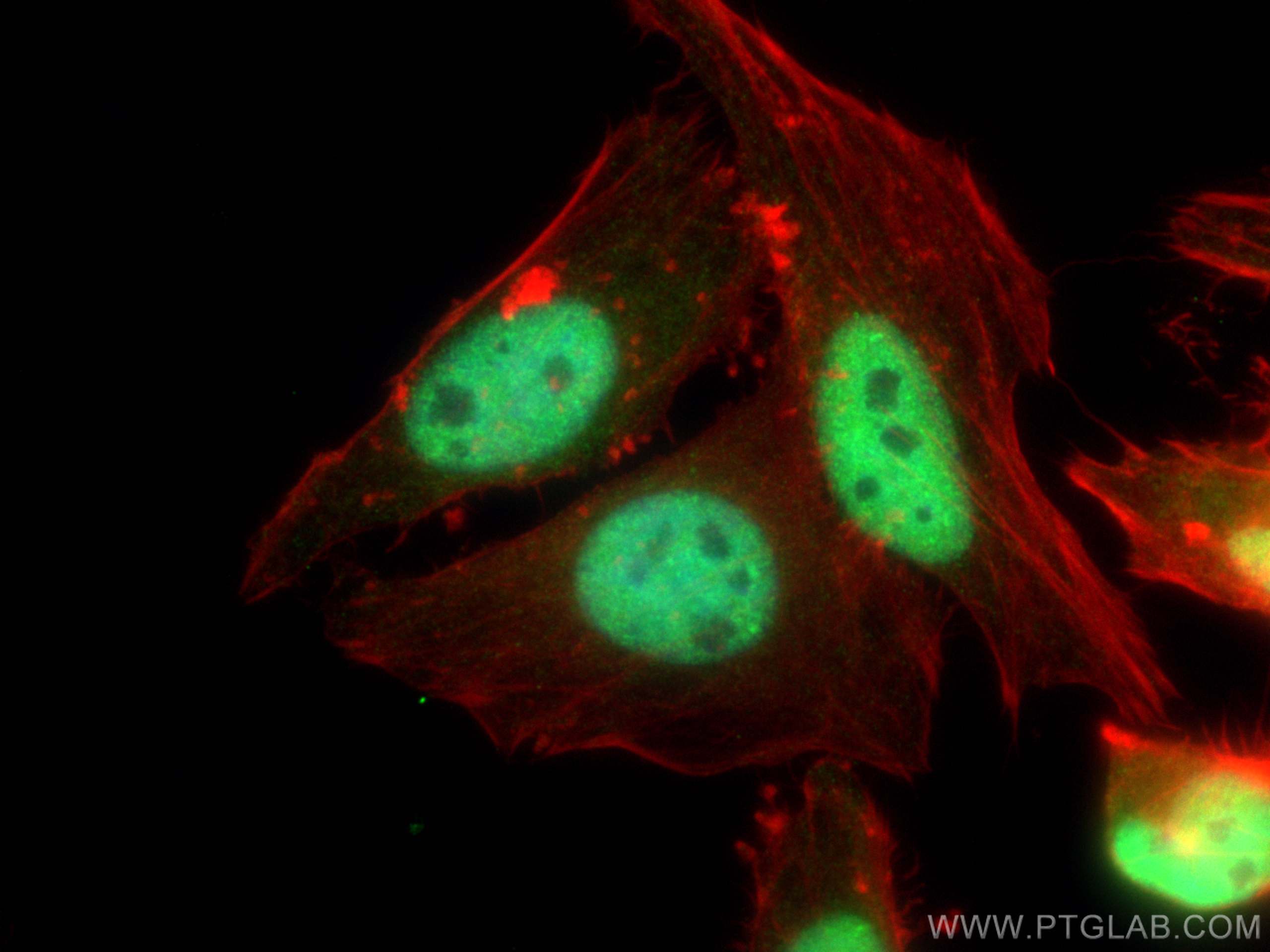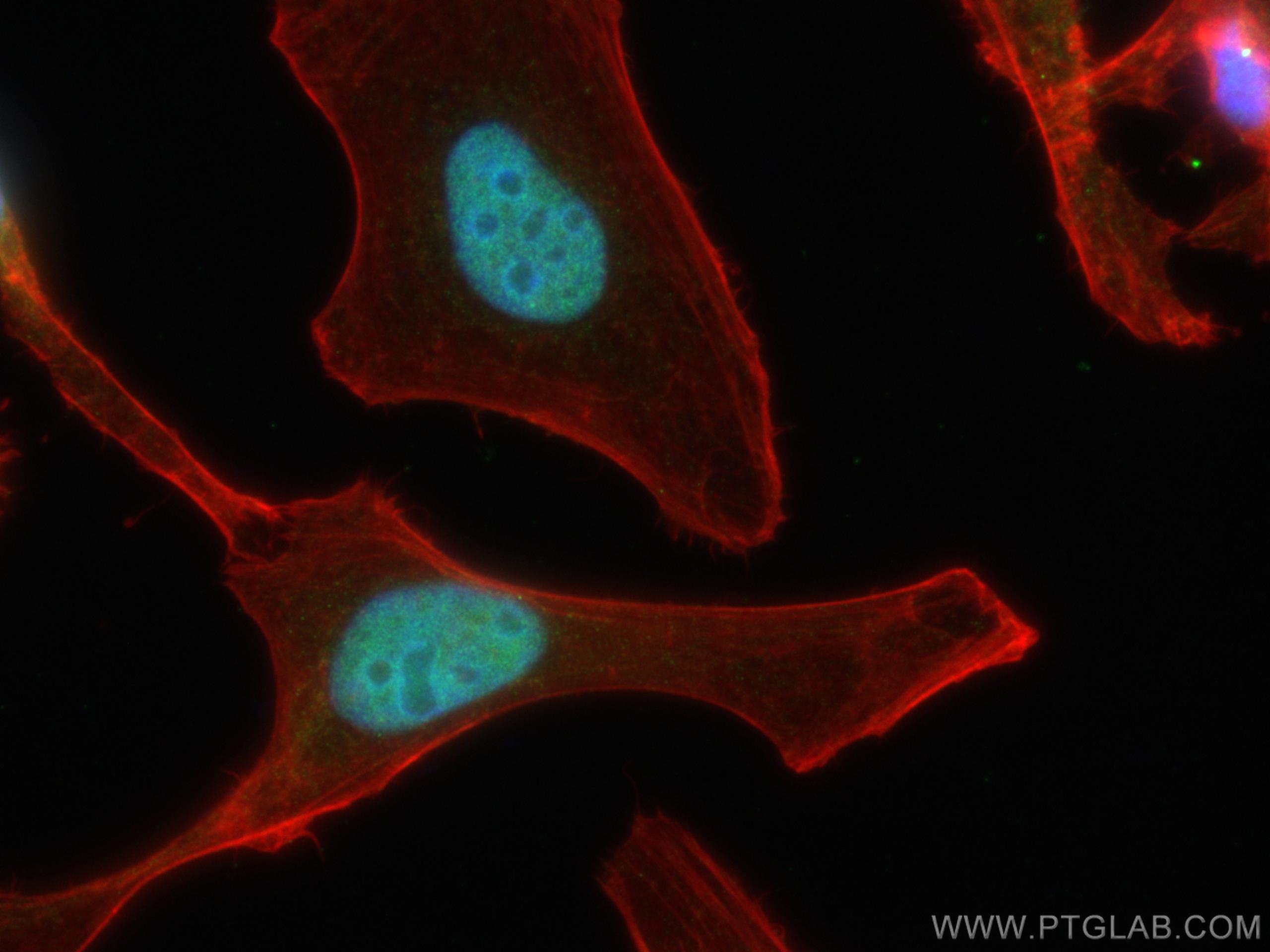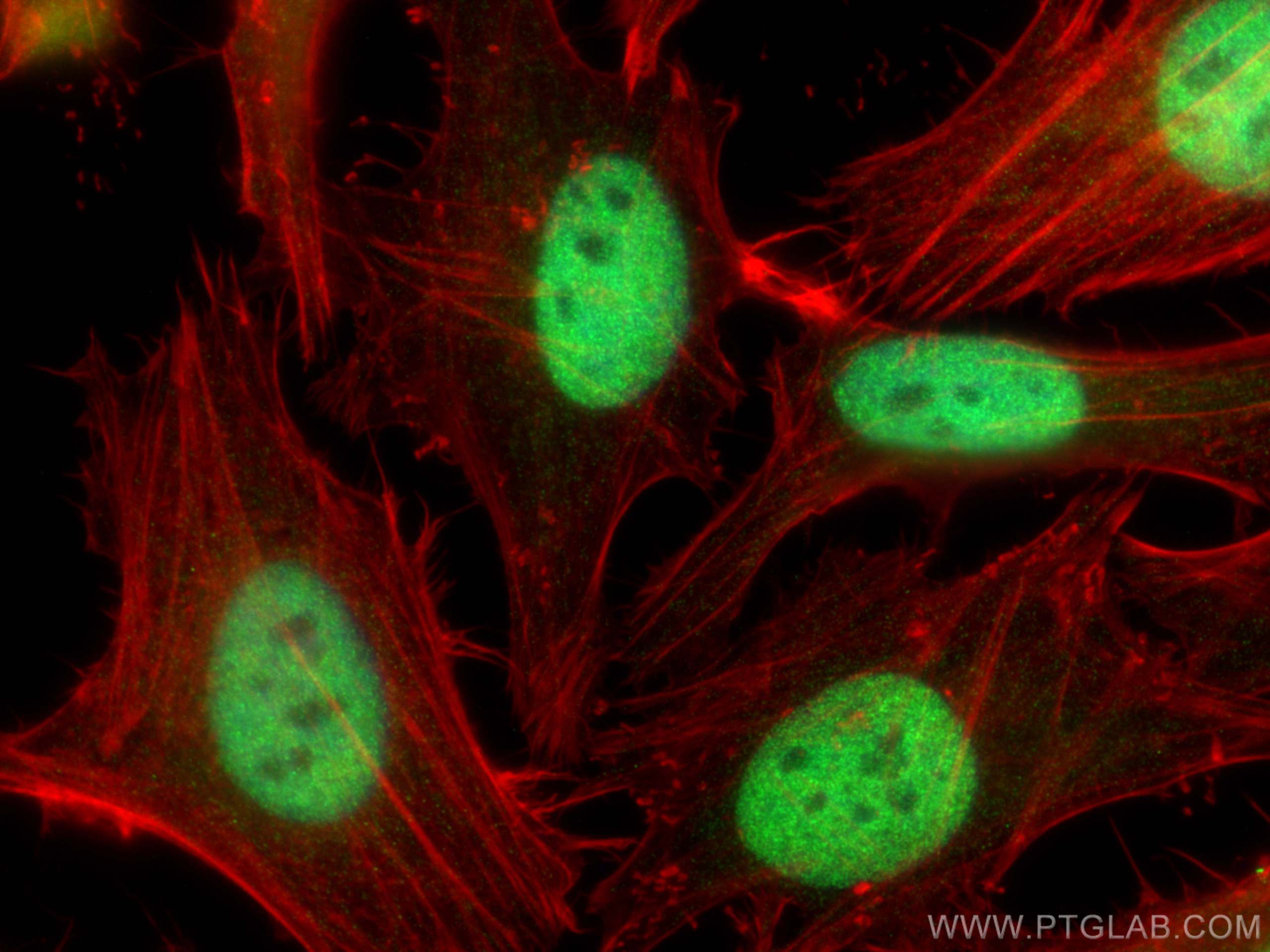Validation Data Gallery
Tested Applications
| Positive WB detected in | HEK-293 cells, HeLa cells |
| Positive IP detected in | HeLa cells |
| Positive IF/ICC detected in | HeLa cells |
Recommended dilution
| Application | Dilution |
|---|---|
| Western Blot (WB) | WB : 1:1000-1:6000 |
| Immunoprecipitation (IP) | IP : 0.5-4.0 ug for 1.0-3.0 mg of total protein lysate |
| Immunofluorescence (IF)/ICC | IF/ICC : 1:500-1:2000 |
| It is recommended that this reagent should be titrated in each testing system to obtain optimal results. | |
| Sample-dependent, Check data in validation data gallery. | |
Published Applications
| KD/KO | See 29 publications below |
| WB | See 82 publications below |
| IHC | See 4 publications below |
| IF | See 8 publications below |
| IP | See 4 publications below |
| CoIP | See 2 publications below |
| RIP | See 1 publications below |
Product Information
12916-1-AP targets CUL4B in WB, IHC, IF/ICC, IP, CoIP, RIP, ELISA applications and shows reactivity with human, mouse samples.
| Tested Reactivity | human, mouse |
| Cited Reactivity | human, mouse, rat, canine |
| Host / Isotype | Rabbit / IgG |
| Class | Polyclonal |
| Type | Antibody |
| Immunogen |
CatNo: Ag3563 Product name: Recombinant human CUL4B protein Source: e coli.-derived, PGEX-4T Tag: GST Domain: 1-351 aa of BC036216 Sequence: MMSQSSGSGDGNDDEATTSKDGGFSSPSPSAAAAAQEVRSATDGNTSTTPPTSAKKRKLNSSSSSSSNSSNEREDFDSTSSSSSTPPLQPRDSASPSTSSFCLGVSVAASSHVPIQKKLRFEDTLEFVGFDAKMAEESSSSSSSSSPTAATSQQQQLKNKSILISSVASVHHANGLAKSSTTVSSFANSKPGSAKKLVIKNFKDKPKLPENYTDETWQKLKEAVEAIQNSTSIKYNLEELYQAVENLCSYKISANLYKQLRQICEDHIKAQIHQFREDSLDSVLFLKKIDRCWQNHCRQMIMIRSIFLFLDRTYVLQNSMLPSIWDMGLELFRAHIISDQKVQNKTIDGIL 相同性解析による交差性が予測される生物種 |
| Full Name | cullin 4B |
| Calculated molecular weight | 913 aa, 104 kDa |
| Observed molecular weight | 102 kDa |
| GenBank accession number | BC036216 |
| Gene Symbol | CUL4B |
| Gene ID (NCBI) | 8450 |
| RRID | AB_2086699 |
| Conjugate | Unconjugated |
| Form | |
| Form | Liquid |
| Purification Method | Antigen affinity purification |
| UNIPROT ID | Q13620 |
| Storage Buffer | PBS with 0.02% sodium azide and 50% glycerol{{ptg:BufferTemp}}7.3 |
| Storage Conditions | Store at -20°C. Stable for one year after shipment. Aliquoting is unnecessary for -20oC storage. |
Background Information
Cullin-RING ligases (CRLs) complexes participate in the regulation of diverse cellular processes, including cell cycle progression, transcription, signal transduction and development (PMID: 21816341)(PMID: 21554755). Serving as the scaffold protein, cullins are crucial for the assembly of ligase complexes, which recognize and target various substrates for proteosomal degradation. Two cullin 4 (CUL4) proteins, CUL4A (87 kDa) and CUL4B(104 kDa), are two members in cullin family with 83% of identity. Mutations in human CUL4B are one of the major causes of X-linked mental retardation. Cul4b knockout mice demonstrated that CUL4B is indispensable for embryonic development in the mouse (PMID: 22606329). This antibody may detect both CUL4A (87 kDa) and CUL4B(104 kDa).
Protocols
| Product Specific Protocols | |
|---|---|
| IF protocol for CUL4B antibody 12916-1-AP | Download protocol |
| IP protocol for CUL4B antibody 12916-1-AP | Download protocol |
| WB protocol for CUL4B antibody 12916-1-AP | Download protocol |
| Standard Protocols | |
|---|---|
| Click here to view our Standard Protocols |
Publications
| Species | Application | Title |
|---|---|---|
Cell Systematic discovery of mutation-directed neo-protein-protein interactions in cancer. | ||
Cell FBXO44 promotes DNA replication-coupled repetitive element silencing in cancer cells.
| ||
Science CRL4 complex regulates mammalian oocyte survival and reprogramming by activation of TET proteins. | ||
Nat Med Immunomodulatory drugs disrupt the cereblon-CD147-MCT1 axis to exert antitumor activity and teratogenicity.
| ||
Science Anticancer sulfonamides target splicing by inducing RBM39 degradation via recruitment to DCAF15. |

